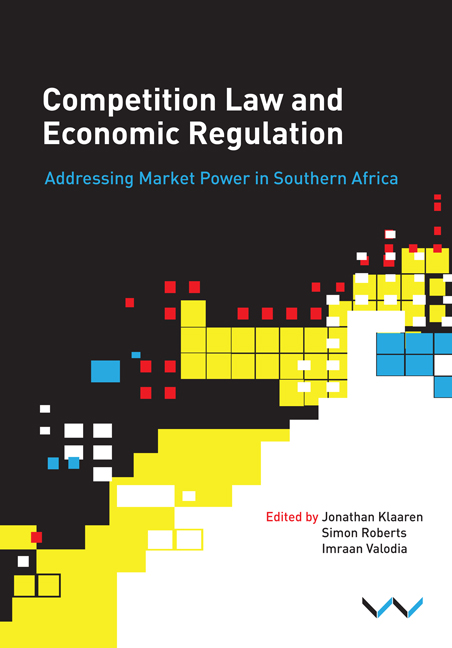 Competition Law and Economic Regulation in Southern Africa
Competition Law and Economic Regulation in Southern Africa Book contents
- Frontmatter
- Contents
- Tables, figures and boxes
- Acknowledgements
- Acronyms and abbreviations
- Introduction: The development of competition and regulation in southern Africa
- Part One Cartel law enforcement
- 1 Penalties and settlements for South African cartels: An economic review
- 2 Cartel likelihood, duration and deterrence in South Africa
- 3 Cartel enforcement in the southern African neighbourhood
- Part Two Issues in competition and regulation
- Part Three Competition and regulation in reshaping African markets
- Part Four Conclusion
- Contributors
- Index
1 - Penalties and settlements for South African cartels: An economic review
from Part One - Cartel law enforcement
Published online by Cambridge University Press: 23 March 2018
- Frontmatter
- Contents
- Tables, figures and boxes
- Acknowledgements
- Acronyms and abbreviations
- Introduction: The development of competition and regulation in southern Africa
- Part One Cartel law enforcement
- 1 Penalties and settlements for South African cartels: An economic review
- 2 Cartel likelihood, duration and deterrence in South Africa
- 3 Cartel enforcement in the southern African neighbourhood
- Part Two Issues in competition and regulation
- Part Three Competition and regulation in reshaping African markets
- Part Four Conclusion
- Contributors
- Index
Summary
INTRODUCTION
The South African competition authorities have developed a fairly extensive track record in penalising cartels. While the Competition Act (No. 89 of 1998) came into force in September 1999, in practice cartels really started being uncovered only after the Competition Commission of South Africa's (CCSA) adoption of a corporate leniency programme in 2004 and the programme's amendment in 2008 (Lavoie, 2010; Makhaya, Mkwananzi and Roberts, 2012). Since then there have been a large number of cases (see also World Bank and ACF, 2016), and the experience provides interesting insight into the challenges faced in making decisions regarding the appropriate penalties. In 2011 and 2012, the Competition Tribunal and the Competition Appeal Court (CAC) made a series of decisions around the issues and relevant principles for determining penalties for collusion. And, from 2012 to 2014, the CCSA undertook an extensive ‘fast-track settlement’ process for collusion by construction companies involving lower penalties in exchange for an ‘all-in’ settlement of bid-rigging conduct (Roberts, 2014). With criminal sanctions for collusive conduct coming into force in 2016, it is also a good point to assess the penalties under the administrative regime up until that point.
The Corporate Leniency Policy's (CLP) notable success in uncovering cartel conduct in South Africa has highlighted both the importance of high-powered incentives for colluding firms to break ranks and come forward, as well as the ongoing extent of collusive activity. The latter suggests that the combined effect of the penalties and the probability of getting caught were previously too low to achieve the necessary deterrent effect. In chapter 2 of this volume, Ratshidaho Maphwanya addresses leniency and other factors underlying the durability of cartels.
We consider the decisions of the Tribunal and CAC through the lens of economic principles and the implications for evolving standards for penalties, and set out how cartel penalties can be understood in terms of the basic economic theory relating to deterrence and incentives. We then review how the CCSA has approached penalties, which have mainly been in the form of settlements. Settlement implies a lower penalty in exchange for cooperation and early resolution. Our review includes a brief discussion of the construction settlements.
- Type
- Chapter
- Information
- Competition Law and Economic Regulation in Southern AfricaAddressing Market Power in Southern Africa, pp. 13 - 48Publisher: Wits University PressPrint publication year: 2017


